- Page 1: STUDIES IN ARMENIAN ETYMOLOGY WITH
- Page 4 and 5: Promotiecommissie Promotiecommissie
- Page 6 and 7: ACKNOWL ACKNOWLEDGEMENTS ACKNOWL AC
- Page 8 and 9: B. Aspects Aspects Aspects Aspects
- Page 10 and 11: 2.1.35 Allegro 2.1.36 Tabu, euphemi
- Page 12 and 13: 3.7.2 `crooked, twisting, bending'
- Page 14 and 15: The lexical stock heavily relies up
- Page 17 and 18: agannnn aga aga aga `zealous (child
- Page 19 and 20: The initial ha�- in S�atax ha
- Page 21 and 22: Buzand's History; cf. Aɫjk` < Aɫc
- Page 23 and 24: she too refers to Pedersen; cf. s.v
- Page 25 and 26: The Armenian and Georgian words may
- Page 27 and 28: Bartholomae 1904, s.v.; Pokorny 195
- Page 29: caught by hunters rather than to si
- Page 33 and 34: HinBr�), acux is glossed by gorce
- Page 35 and 36: (from xanj- `to scorch, singe', q.v
- Page 37 and 38: For possible Caucasian parallels se
- Page 39 and 40: aaaaɫam ɫam, ɫam ɫam aor. aɫac
- Page 41 and 42: The medial laryngeal followed by a
- Page 43 and 44: ����DIAL DIAL Widespread in
- Page 45 and 46: is unexplained. Hambarjumyan (1998:
- Page 47 and 48: The word (aɫj�amuɫj�, var. a
- Page 49 and 50: 1: 336b], �arabaɫ əɫtamuɫt, i
- Page 51 and 52: expects Arm. *ha-; the reconstructi
- Page 53 and 54: Bible+. ����DIAL DIAL Diale
- Page 55 and 56: Attested in Bible five times; once
- Page 57 and 58: Xnko-Aper: amlik gar� `amlik lamb
- Page 59 and 60: Toch. B eprer `atmosphere, sky, fir
- Page 61 and 62: T`ovma Arcruni (9-10th cent.) 2.7:
- Page 63 and 64: ����ETYM ETYM A‰ar�yan
- Page 65 and 66: *h1h1i-ueh2-eh2- or *h1oh1i-ueh2-eh
- Page 67 and 68: 2004-05: 154. Clackson (ibid.) poin
- Page 69 and 70: clear textual illustration of this
- Page 71 and 72: Jasanoff (1979: 145; see also Vired
- Page 73 and 74: and unclean animals that is largely
- Page 75 and 76: That analut` is taken by Soukry, He
- Page 77 and 78: I propose a connection with PIE *h1
- Page 79 and 80: `to become (liter.: to cut) thin' [
- Page 81 and 82:
expresses the idea of having sth. o
- Page 83 and 84:
thus, as `the outer part of estate/
- Page 85 and 86:
dr�an cɫxni "hinge of the door".
- Page 87 and 88:
NSg *h2e�nHt-ih2, ASg *h2(e)nHt-i
- Page 89 and 90:
o-type (cf. NHB; HAB; Astuacaturean
- Page 91 and 92:
assimilation nb...nd > nd...nd. Thi
- Page 93 and 94:
might have been reshaped analogical
- Page 95 and 96:
other examples and discussion see 2
- Page 97 and 98:
initial ha-: Goris hanic, hanɛc [M
- Page 99 and 100:
A similar alternation *k^on-/*k^n-
- Page 101 and 102:
chambers and treasure houses and wi
- Page 103 and 104:
dul anjinn "he permitted himself n
- Page 105 and 106:
Meillet (1936: 29) points out that
- Page 107 and 108:
anun, anun anun anun an-stem: GDSg
- Page 109 and 110:
exception is ClArm. van-k`, -ac`, w
- Page 111 and 112:
-lea- in the same passages show tha
- Page 113 and 114:
(1913=1991: 179; transl. Thomson 19
- Page 115 and 116:
confusion) between `palate' and `uv
- Page 117 and 118:
����ETYM ETYM NHB (1: 298a)
- Page 119 and 120:
the dialects the meaning is `brook'
- Page 121 and 122:
aseɫn, GSg asɫan), which is alleg
- Page 123 and 124:
Attested only in Severian of Gabala
- Page 125 and 126:
(1958: 59a) records sg. astɫa and
- Page 127 and 128:
may be borrowed from the IE one. Th
- Page 129 and 130:
It has been suggested also that ara
- Page 131 and 132:
unchanged (which is true but not es
- Page 133 and 134:
(-�-), though not attested in Sep
- Page 135 and 136:
practically the same area, named he
- Page 137 and 138:
����DIAL DIAL Preserved in
- Page 139 and 140:
due to influence of the unpreserved
- Page 141 and 142:
J�ahukyan (1982: 71; 1983: 90; 19
- Page 143 and 144:
The prothetic vowel a- in argat is
- Page 145 and 146:
A‰ar�yan does not cite dialecta
- Page 147 and 148:
Note e�reriwn in a folk-song (Mna
- Page 149 and 150:
ascribed to the compositional loss
- Page 151 and 152:
Bible+. In Psalms 106.37 (APl art-s
- Page 153 and 154:
artasu-k` (pl.). A better alternati
- Page 155 and 156:
highly doubtful. Matzinger (2000) p
- Page 157 and 158:
If reliable, this explanation of d
- Page 159 and 160:
intermediary source (note the loss
- Page 161 and 162:
For the semantic relationship `mous
- Page 163 and 164:
`mouse' (Lex.), etc.; see also belo
- Page 165 and 166:
����ETYM ETYM Since Patruba
- Page 167 and 168:
2001: 171a]. A textual illustration
- Page 169 and 170:
examples with an aberrant -t- (inst
- Page 171 and 172:
In Armenian tradition, too, there m
- Page 173 and 174:
sheep" (o‰`xarneri p`ap`uk mis) [
- Page 175 and 176:
Adonc` (1938: 457 = 1972: 391) hesi
- Page 177 and 178:
oyt`1, boyt` boyt` boyt` a-stem (Bi
- Page 179 and 180:
SCr. bi�lje `plants, grass' (Slav
- Page 181 and 182:
Lor�i borex-a-muk `mole' [Amatuni
- Page 183 and 184:
suffix" -eni (cf. Olsen 1999: 414)
- Page 185 and 186:
we are dealing with a compound of t
- Page 187 and 188:
����DIAL DIAL Sebastia gal
- Page 189 and 190:
In view of formal (Arm. g instead o
- Page 191 and 192:
guttural; 4) semantics. Clackson (1
- Page 193 and 194:
Nrs. 385-386), geɫj-i `yew-tree, T
- Page 195 and 196:
����ETYM ETYM There cam be
- Page 197 and 198:
Olsen (1999: 439) compares with Gr.
- Page 199 and 200:
unless one assumes dissimilation as
- Page 201 and 202:
The postulation of a compound (see
- Page 203 and 204:
eastern dialects: Goris k y u�ɫ
- Page 205 and 206:
The etymology is plausible, though,
- Page 207 and 208:
�������� ���
- Page 209 and 210:
Yovhanne�s O�jnec`i (8th cent.)
- Page 211 and 212:
*u�(e)l-i�-o�s, cf. Gr. �
- Page 213 and 214:
may be interpreted as an original H
- Page 215 and 216:
Arm. don is not attested in the old
- Page 217 and 218:
interesting. Is there an etymology?
- Page 219 and 220:
Note that Arm. dial. turg, possibly
- Page 221 and 222:
����DIAL DIAL Preserved in
- Page 223 and 224:
On the other hand, A‰ar�yan (HA
- Page 225 and 226:
contaminaton is possible. Compare a
- Page 227 and 228:
It has been assumed that erir `thir
- Page 229 and 230:
Probably, Xotorj�ur *ɛrelt`at` `
- Page 231 and 232:
Alternative 2): Arm. erinj� `youn
- Page 233 and 234:
J�uɫa y'etkar or yetkar `far awa
- Page 235 and 236:
non-translational works (Eznik Koɫ
- Page 237 and 238:
колючее растение' [O
- Page 239 and 240:
I think, zaysem and zaysaysem are c
- Page 241 and 242:
place, stadium (John Chrysostom); f
- Page 243 and 244:
. The r-l fluctuation can perhaps b
- Page 245 and 246:
Movse�s Xorenac`i, Paterica, Nilu
- Page 247 and 248:
above-mentioned assumption of Clack
- Page 249 and 250:
change *pt- > Arm. t`-, however, se
- Page 251 and 252:
In view of the semantic field `feat
- Page 253 and 254:
2003: 379, 567]; Adana t`ət`er�n
- Page 255 and 256:
*t`ət`əɫmarik (with distant meta
- Page 257 and 258:
t`it`eɫn `butterfly' is nowhere el
- Page 259 and 260:
that ma�k-a-t`it`er� occurs in
- Page 261 and 262:
����DIAL DIAL Widespread in
- Page 263 and 264:
`Oberschenkel, Arschbacke'. For the
- Page 265 and 266:
introduces also Arm. t`uk` and Gr.
- Page 267 and 268:
however, considers Arm. ilik `marro
- Page 269 and 270:
Almost all of the Armenian forms se
- Page 271 and 272:
The only formal problem with oɫork
- Page 273 and 274:
[On orlor see V. Ar�ak`elyan 1984
- Page 275 and 276:
*lusan----n *lusan *lusan *lusan n
- Page 277 and 278:
folk-etymological (especially if on
- Page 279 and 280:
xand, xand xand xand i-stem in Movs
- Page 281 and 282:
����DIAL DIAL See s.v.v. xe
- Page 283 and 284:
Karst (1911: 425) compares xonj�
- Page 285 and 286:
Since the meaning `step-, alien' de
- Page 287 and 288:
More attractive is PGerm. *kit-l- `
- Page 289 and 290:
For the above-mentioned k`m-caɫrel
- Page 291 and 292:
can-ak(-) `disgrace' (Bible+; diale
- Page 293 and 294:
cil, cil cil cil verbal clem clem c
- Page 295 and 296:
Concordance (Astuacaturean 1895: 74
- Page 297 and 298:
����ETYM ETYM `milk' (see H
- Page 299 and 300:
"History" of the 11th century autho
- Page 301 and 302:
HAB, ibid.; Ali�an 1895: 342, 611
- Page 303 and 304:
kamurj� kamurj kamurj kamurj�,
- Page 305 and 306:
Georg. k'ip'or‰'i `a log that ser
- Page 307 and 308:
kart` kart` kart` kart` i-stem `fis
- Page 309 and 310:
e realized as such, and k...t shoul
- Page 311 and 312:
kaɫ `lame' and *keɫ `crooked'. Vi
- Page 313 and 314:
Eɫi�e�, etc.), `goal, purpose'
- Page 315 and 316:
(i.e. OIc. heitr `hot' etc.) is als
- Page 317 and 318:
een treated as an Iranian loan (cf.
- Page 319 and 320:
����ETYM ETYM See s.v. *klm
- Page 321 and 322:
I propose to treat kokov- as a redu
- Page 323 and 324:
����ETYM ETYM Meillet (1900
- Page 325 and 326:
uncertain [Mayrhofer, EWAia 1, 1992
- Page 327 and 328:
as some parallels from other langua
- Page 329 and 330:
`scorpion' = kor-kor agi [Andreasya
- Page 331 and 332:
practically the same explanation. H
- Page 333 and 334:
dialectal meaning `to return' of kr
- Page 335 and 336:
quickly broken". Arm. erek`-kuɫ co
- Page 337 and 338:
semantics cf. Sogd. ''p'y- `to watc
- Page 339 and 340:
For possible traces of PArm. *Han-
- Page 341 and 342:
����DIAL DIAL Widespread in
- Page 343 and 344:
another derivation of the same PIE
- Page 345 and 346:
and/or Lith. armuo~ `arable land' (
- Page 347 and 348:
a preposition/preverb such as *h2ep
- Page 349 and 350:
����DIAL DIAL Ham�en hɔr
- Page 351 and 352:
A‰ar�yan (HAB 3: 98-99; cf. als
- Page 353 and 354:
206) based himself on the readings
- Page 355 and 356:
Bible+. Spelled also as hncan. Seve
- Page 357 and 358:
2: 781; Sarad�eva 1986: 19-20; An
- Page 359 and 360:
����ETYM ETYM Scheftelowitz
- Page 361 and 362:
Redupl. hot-(h)ot-: In a paper wher
- Page 363 and 364:
him, T`iflis jabri is borrowed from
- Page 365 and 366:
The by-form jo joɫun jo joɫun ɫu
- Page 367 and 368:
mulberry-trees' [H. Muradyan 1967:
- Page 369 and 370:
kic-/ki‰- `to bite, sting' [HAB 3
- Page 371 and 372:
����ETYM ETYM The compound
- Page 373 and 374:
`precipice, ascent'. However, Arm.
- Page 375 and 376:
As mak`i generally denotes the fema
- Page 377 and 378:
����ET ET ETYM ET YM Accord
- Page 379 and 380:
kind of manna which is set on leave
- Page 381 and 382:
In Movse�s Xorenac`i 2.86 (1913=1
- Page 383 and 384:
this is a dialectal form. One may a
- Page 385 and 386:
mɔ�ɛ. The final -ɛ in this dia
- Page 387 and 388:
62, and the glossary). I posit an o
- Page 389 and 390:
Structurally, Gr. ���-��
- Page 391 and 392:
347b; Mij�HayBar� 2, 1992: 146a
- Page 393 and 394:
mrj�iwn mrj mrj mrj�iwn �iwn
- Page 395 and 396:
Alternatively, *mu� `fog' may be
- Page 397 and 398:
`attack, assault' > `victorious, mi
- Page 399 and 400:
to have been borrowed from Arm. yat
- Page 401 and 402:
Bible+. ����DIAL DIAL Diale
- Page 403 and 404:
Meillet (1894b: 2802) derives yolov
- Page 405 and 406:
invoke' from QIE *g w ot-i�e- (cf
- Page 407 and 408:
preferable since both nawt`i and
- Page 409 and 410:
seen, neroy is attested only once,
- Page 411 and 412:
In view of phonological problems,
- Page 413 and 414:
Olsen (1999: 94116) points out that
- Page 415 and 416:
(1978-79: 9-10) is sceptical, since
- Page 417 and 418:
����ETYM ETYM Together with
- Page 419 and 420:
The only classical attestation is f
- Page 421 and 422:
combines the meanings of xayt`em an
- Page 423 and 424:
neck" in HAB 3: 522b and in S. Movs
- Page 425 and 426:
J�ahukyan himself points out, is
- Page 427 and 428:
����DIAL DIAL Preserved in
- Page 429 and 430:
The an-stem seen in GDSg oɫan in E
- Page 431 and 432:
A‰ar�yan (HAB 3: 561b < Meillet
- Page 433 and 434:
To explain the aspirated -t` in ort
- Page 435 and 436:
out that the vowel of the suffix is
- Page 437 and 438:
etween `mouse; rat' and `weasel' cf
- Page 439 and 440:
semantically matching the Armenian
- Page 441 and 442:
Astɫik. And they frequently recite
- Page 443 and 444:
knew the basic meaning `fruit', whi
- Page 445 and 446:
down; cf. synonymical amankotruk et
- Page 447 and 448:
����ETYM ETYM Connected wit
- Page 449 and 450:
One may assume that we are dealing
- Page 451 and 452:
`fence, knit', as well as with Arm.
- Page 453 and 454:
K, 1980: 302-304; J�ahukyan 1987:
- Page 455 and 456:
Tigranakert zələxvil `to glide, s
- Page 457 and 458:
1985b: 10-11; 1985a: 61; 1986: 42 =
- Page 459 and 460:
I propose the following scenario. T
- Page 461 and 462:
According to A‰ar�yan (HAB 4: 2
- Page 463 and 464:
*cal was influenced by ta(y)gr `hus
- Page 465 and 466:
In Goris it is probably found in th
- Page 467 and 468:
unknown, and xer and �‰uk, both
- Page 469 and 470:
Since Anania S�irakac`i must have
- Page 471 and 472:
always have an ɔ. This implies tha
- Page 473 and 474:
Note also Mu� par`eki hulunk` `sp
- Page 475 and 476:
suggest the following paradigm: NSg
- Page 477 and 478:
und, o-stem: ISg ənd-o-v in Yovhan
- Page 479 and 480:
Given that Arm. un‰`-k` the princ
- Page 481 and 482:
S�atax u‰ `soot' (see M. Murady
- Page 483 and 484:
����SEMANTICS SEMANTICS The
- Page 485 and 486:
According to A‰ar�yan (HAB 3: 6
- Page 487 and 488:
(allative) function in y-o (< *i-o,
- Page 489 and 490:
of ordi from *portio-. The connecti
- Page 491 and 492:
Laz p h anc'ala `spleen' (next to G
- Page 493 and 494:
of melancholy or morose feelings (O
- Page 495 and 496:
k`aɫrt`-ac`); no manuscript has -r
- Page 497 and 498:
-����� f. `a sea-fish' [H
- Page 499 and 500:
cf. Arm. kari‰ `scorpion', dial.
- Page 501 and 502:
����ETYM ETYM No etymology
- Page 503 and 504:
According to Yampol'skii (apud Dows
- Page 505 and 506:
Dəvnay, i Dəvnay (3.1, see 1851:
- Page 507 and 508:
hayoc`") t`umni `darkness', t`umnan
- Page 509 and 510:
il existe une plate-forme de 140 pa
- Page 511 and 512:
I propose a derivation from PIE *k^
- Page 513 and 514:
PART PART II II EEEEVALUATION VALUA
- Page 515 and 516:
A. ARMENIAN RMENIAN DIALECTS DIALEC
- Page 517 and 518:
Arm. kat`n `milk' has been consider
- Page 519 and 520:
S�ulaver (in the territory of Geo
- Page 521 and 522:
205; Garso�an 1989: 374-375; Hews
- Page 523 and 524:
Arm. gaz(a)pe�n gaz(a)pe gaz(a)pe
- Page 525 and 526:
Xarberd, Akn, Arabkir [kə-class],
- Page 527 and 528:
Alongside of rang, Persian also has
- Page 529 and 530:
Georgian brinj�aos-xe `Celtis aus
- Page 531 and 532:
1.12.4 1.12.4 1.12.4 xu‰i‰ xu
- Page 533 and 534:
J�ahukyan 1987: 505-506, 554, 558
- Page 535 and 536:
Arm. gi�er `night' vs. Lat. vespe
- Page 537 and 538:
change of the type y...s > l...s wh
- Page 539 and 540:
dialectes orientaux), e�tablie pa
- Page 541 and 542:
2.1.13 2.1.13 Loss Loss of of inter
- Page 543 and 544:
Meillet (1936: 38) did not operate
- Page 545 and 546:
On the other hand, there are two wo
- Page 547 and 548:
As to c`ax, which in some dialects
- Page 549 and 550:
If one tries to relate this initial
- Page 551 and 552:
2.1.22.3 2.1.22.3 PIE PIE *sk---- *
- Page 553 and 554:
(initial x- is unexpected); see Che
- Page 555 and 556:
2.1.22.9 2.1.22.9 2.1.22.9 PIE PIE
- Page 557 and 558:
The phonological problems involved
- Page 559 and 560:
influence by that of the first syll
- Page 561 and 562:
explanation is: 1) tzruk > *tzdruk,
- Page 563 and 564:
One might expect metathesis also in
- Page 565 and 566:
which would have an initial k- in H
- Page 567 and 568:
Martiros > Gor. Mərtu�ris (see L
- Page 569 and 570:
ar�a‰`el `to bellow' > bər�a
- Page 571 and 572:
*ar�-i-koɫ `precipitous, sloped'
- Page 573 and 574:
According to M. Muradyan (1962: 64)
- Page 575 and 576:
*-ewarbi. Aɫabekyan (1981: 104) po
- Page 577 and 578:
Compare p`esay `bridegroom; son-in-
- Page 579 and 580:
Tabu has often been incorrectly inv
- Page 581 and 582:
suits the classical literary contex
- Page 583 and 584:
Note that mo- does not usually yiel
- Page 585 and 586:
(1913=1991: 32-37; additional readi
- Page 587 and 588:
araz `dream' (cf. also the A‰ar
- Page 589 and 590:
2.2.2.1 2.2.2.1 2.2.2.1 *s----stem
- Page 591 and 592:
p` (after *-r-) point to the nom. *
- Page 593 and 594:
Sometimes erkok`ean is replaced by
- Page 595 and 596:
J�ahukyan (1987: 380) mentions t`
- Page 597 and 598:
A‰ar�yan (HAB 3: 431b) mentions
- Page 599 and 600:
----kn kn kn kn For examples see J
- Page 601 and 602:
not very probable. Nevertheless, it
- Page 603 and 604:
In spand, i-stem `slaughter' (cf. s
- Page 605 and 606:
Malxasyanc` (1987: 267) translates
- Page 607 and 608:
Minor [Karpenko 1981: 45]. Of the A
- Page 609 and 610:
`Pleiades' as containing the zero-g
- Page 611 and 612:
Arm. Kat`in cir or Cir kat`in Kat`i
- Page 613 and 614:
y L. Hovhannisyan 1990: 230, this i
- Page 615 and 616:
therefore called *ar�aj�-awor `
- Page 617 and 618:
For the contrast with wolves see th
- Page 619 and 620:
In a folk-song consisting of a seri
- Page 621 and 622:
and in fasts, the horse was very go
- Page 623 and 624:
Bearing in mind this material, one
- Page 625 and 626:
Note especially that, by Haza�ra
- Page 627 and 628:
�i�dkij, SCr. �i�dak, etc.
- Page 629 and 630:
corroborated by dial. (Bu�t`ania/
- Page 631 and 632:
A‰ar�yan (ibid., citing also "A
- Page 633 and 634:
One may assume that the phrase "to
- Page 635 and 636:
was called Paxray, possibly identic
- Page 637 and 638:
3.5.2.6 3.5.2.6 3.5.2.6 ‰r� ‰
- Page 639 and 640:
The element -ac` in *xm-ac`-o�j i
- Page 641 and 642:
Some (possible) examples: Lat. tero
- Page 643 and 644:
We find it, for example, in a fairy
- Page 645 and 646:
Meɫri ‰`ak` `shin-bone of cattle
- Page 647 and 648:
a loanword if it is characterized b
- Page 649 and 650:
fauna: erbuc `breast of animals'; l
- Page 651 and 652:
name variants turn out to contain t
- Page 653 and 654:
One might also find similar example
- Page 655 and 656:
A similar case (with the same struc
- Page 657 and 658:
vkayarank`n: i Dizap`ayt lerinn i K
- Page 659 and 660:
BIBLIOGRAPHY BIBLIOGRAPHY Abaev, V.
- Page 661 and 662:
1902 (A‰ar�ean), T`urk`ere�ne
- Page 663 and 664:
1972 Hayastani patmut`yun. Yerevan:
- Page 665 and 666:
1967 Svediayi barbar�ə (K`ist`in
- Page 667 and 668:
1986 Vimagrakan prptumner. Yerevan:
- Page 669 and 670:
228-245. 1985 The origins of the In
- Page 671 and 672:
Hem�indialekt. Amsterdam/Atlanta:
- Page 673 and 674:
Kommission bei Jacob Dybwad; A. W.
- Page 675 and 676:
2006 Armenian Job: reconstructed Gr
- Page 677 and 678:
Diakonoff, I. M. see D'jakonov. Dow
- Page 679 and 680:
Klasse. Sitzungsberichte 1982/5. Mu
- Page 681 and 682:
Fraenkel, Ernst 1937 Zur baltischen
- Page 683 and 684:
Academia. Gauthiot, Robert 1916 Ira
- Page 685 and 686:
1975b Sovremennoe sostojanie izu‰
- Page 687 and 688:
1971 Ler�nayin �arabaɫi banahy
- Page 689 and 690:
Haneyan, A. N. 1978 Tigranakerti ba
- Page 691 and 692:
1932 Kultur und Sprachgeist in den
- Page 693 and 694:
1904 Die altarmenischen Ortsnamen.
- Page 695 and 696:
71. 1972 Hay barbar�agitut`yan ne
- Page 697 and 698:
1984 Lindeman versus Kortlandt: sum
- Page 699 and 700:
Klimov, G. A. 1964 E�timologi‰e
- Page 701 and 702:
178-189. Krkya�aryan, Simon 1970
- Page 703 and 704:
jazykov. In ArchOr 19: 321-328. 195
- Page 705 and 706:
Indo-European. In HistSpr 103: 20-2
- Page 707 and 708:
1989 (ed.), Ar�ak`el Siwnec`i, Ad
- Page 709 and 710:
Gre�goire de Narek (12-23 de�ce
- Page 711 and 712:
161-164. 1908-09c A� propos de qu
- Page 713 and 714:
1907-08 (1-2), Zur�na-tmbla. Vol.
- Page 715 and 716:
Msereanc`, Lewon 1899 Hayere�n ba
- Page 717 and 718:
Leningrad: "Nauka", Leningradskoe o
- Page 719 and 720:
1985 Ob indoevropejskom proisxo�d
- Page 721 and 722:
1991 Samonazvanie armjan i vopros l
- Page 723 and 724:
1997 Thoughts about the Celtic reli
- Page 725 and 726:
7). 1998/2000 A scholium on Colerid
- Page 727 and 728:
1965 Hindi �ṭ�. In ZVS 79, 3/
- Page 729 and 730:
1988 Wissenschaftsgeschichte und Th
- Page 731 and 732:
Stefano, Giuseppe di and Petronio,
- Page 733 and 734:
translation and commentary; include
- Page 735 and 736:
Slavic traditions in connection wit
- Page 737 and 738:
ModEArm. translation, commentary).
- Page 739 and 740:
Weiss, Michael 1994 On the non-verb
- Page 741 and 742:
AnnArmLing 1: 39-43. 1986 Dictionna
- Page 743 and 744:
1941 "Yaɫags taremtin i Vanakan Va
- Page 745 and 746:
Sources Sources Sources [Throughout
- Page 747 and 748:
Critical edition: M. Minasean, in H
- Page 749 and 750:
famous of all Armenian hitorians, t
- Page 751 and 752:
Glak: by Langlois, ibid. 333-355].
- Page 753 and 754:
London. (Currently published by Sch
- Page 755 and 756:
Fs Goldman 1956 Weinberg, Saul S. (
- Page 757 and 758:
Toporov. Moscow: "Indrik". Fs Watki
- Page 759 and 760:
IncLing Incontri linguistici. Pisa,
- Page 761 and 762:
LezO‰Harc` Lezvi ew o‰i harc`er
- Page 763 and 764:
1993 in Kopenhagen (hrsg. von J. E.
- Page 765 and 766:
Academy Press. See also ProcSISAL (
- Page 767 and 768:
ARMEENSE ETYMOLOGISCHE STUDIES vanu
- Page 769:
CURRICULUM VITAE Ik ben geboren op


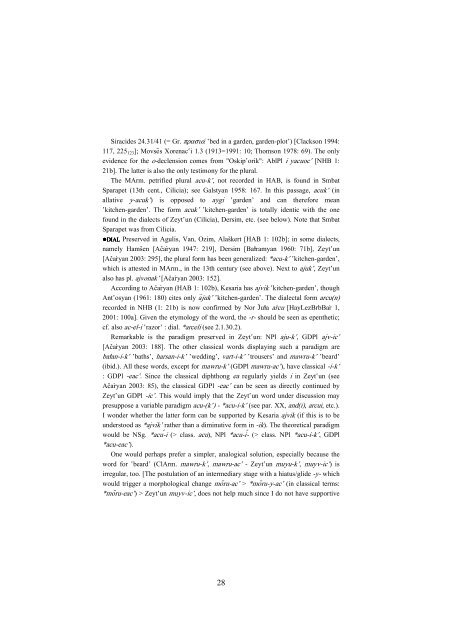
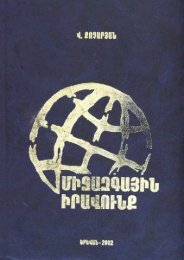



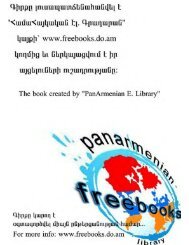
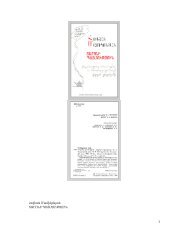


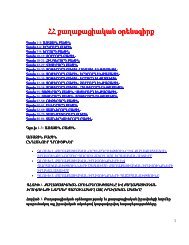



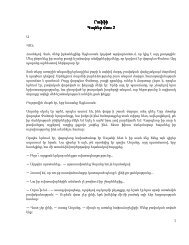
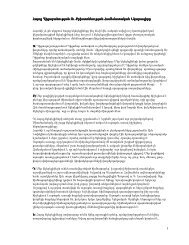
![1 ՍԱՍՈՒՆՑԻ ԴԱՎԻԹ [էջ III] ՀԱՅԿԱԿԱՆ ՀԵՐՈՍԱԿԱՆ ԷՊՈՍԸ ...](https://img.yumpu.com/53543694/1/190x245/1-iii-.jpg?quality=85)